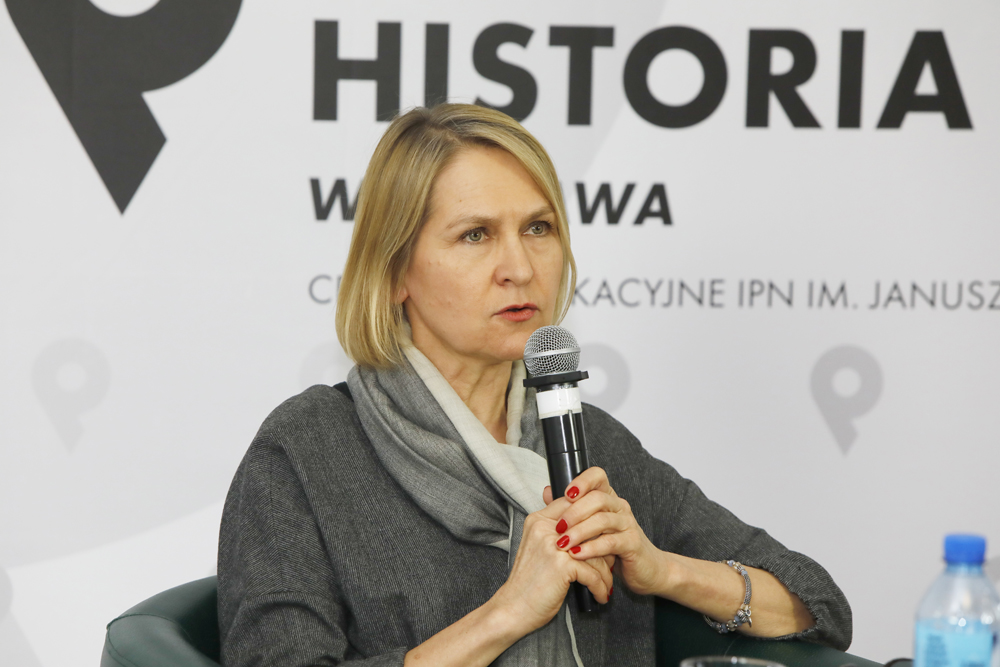
“My conclusions from many years of research are that the reflex to help was determined by Christian morality” – Barbara Stanisławczyk, a journalist and researcher of the history of Poles rescuing the Jewish population from the hands of German oppressors during World War II, said. The AWPE portal and Schuman Optics Magazine had the opportunity to talk to the reporter during the promotion of the reissued edition of her book “Beyond fear”, supplemented with a critical apparatus.
During the meeting with readers, the author pointed out the urgent need to document the fate of individual Polish families and discover their history, as it sometimes happens that the fact of hiding a Jewish family or individual people of this nationality remains hidden in the zone of family secrets. “There are a lot of virgin, undiscovered stories. There is a huge threat – in fact, it is already happening – that they will never be discovered” – she said. She pointed out that many families who hid Jews during the war or helped them in any way never talked about it. The reasons for this state of affairs were different and extremely individual, but the effect was the same.
Stanisławczyk told the story of Henryk Stępniewski, whose father was killed for helping Jews, and as a result of the trauma, nervous system diseases appeared in the family. “I asked Mr. Henryk why he never talked about it, why he didn’t apply for the medal of the Righteous. He said: ‘How can you apply for the medal yourself? It’s not honorable.’ This is typical of those poor Polish families, people from the countryside who guided by Christian morality, because all of them, even if they do not verbalize it, their stories show that this was the main motive they were guided by – helping others, a Christian call to help others in need” – she reported.
She emphasized that those hiding Jews risked their lives and those of their children. In Poland occupied by the Germans – which is often forgotten or there is a conspiracy of silence on this subject – the Germans also punished with death if you knew that your neighbor was hiding Jews and you did not report it to the Gestapo. The occupier only tolerated the attitude of informing – any other attitude was punishable by shooting or burning alive, as was the case in Ciepielów.
“Interestingly, the Jews who sought help during the war asked for it, but did not demand it. In the cases I examined, they did not even have any grudges or great regret about not being sheltered, for example, because they knew what fear is. They knew what death was, which could soon overtake both them and the Poles who were saving them” – she said, adding that “demands, complaints about not enough help, indifference, etc. appear after the war and “This comes from those who have no idea what was happening then, what fear is.”
When asked by the portal AWPE.pl and Schuman Optics Magazine whether the sources she consulted revealed any psychological characteristics of people who decided to endure such enormous tension that accompanied the hiding of Jews due to the constant threat of death, and were able to cope with it, Barbara Stanisławczyk replied: “My conclusions from long-term research are that the impulse to help was determined by Christian morality”. “In this morality, both believers and non-believers were brought up, people who left God, who may never have had God in their hearts, but those who accepted the principles of Western civilization. Please do not forget that this civilization is based on morality Christian, on the ten commandments, to put it briefly” – she clarified. “The morality resounds from all of them” – she emphasized.
Barbara Stanisławczyk appealed for the creation of a team that would describe Polish aid to the Jewish population during the German occupation. “If we do not do this, we will be placed in one row with complicits” – she said. “This is our duty” – she added, pointing out that everyone who provided such help should be found, just as the perpetrators were found.A
Anna Wiejak
